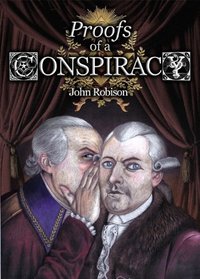Search -
Proofs of a Conspiracy against all the Religions and Governments of Europe, carried on in the secret meetings of Freemasons, Illuminati and Reading Societies
Proofs of a Conspiracy against all the Religions and Governments of Europe carried on in the secret meetings of Freemasons Illuminati and Reading Societies
Author:
Proofs of a Conspiracy discusses the rôle of Continental-style Freemasonry, Adam Weishaupt's Illuminati, and Karl Friedrich Bahrdt's German Union in disseminating the 'Enlightenment' ideas that led to the French Revolution, and is also the founding text of the modern conspiracy theory of history in the English language. Whatever criticisms may b... more »
Author:
Proofs of a Conspiracy discusses the rôle of Continental-style Freemasonry, Adam Weishaupt's Illuminati, and Karl Friedrich Bahrdt's German Union in disseminating the 'Enlightenment' ideas that led to the French Revolution, and is also the founding text of the modern conspiracy theory of history in the English language. Whatever criticisms may b... more »
ISBN-13: 9781909606036
ISBN-10: 1909606030
Publication Date: 2/28/2014
Pages: 532
Edition: Annotated
Rating: ?
ISBN-10: 1909606030
Publication Date: 2/28/2014
Pages: 532
Edition: Annotated
Rating: ?
0 stars, based on 0 rating
Publisher: Wermod and Wermod Publishing Group
Book Type: Hardcover
Other Versions: Paperback
Members Wishing: 2
Reviews: Amazon | Write a Review
Book Type: Hardcover
Other Versions: Paperback
Members Wishing: 2
Reviews: Amazon | Write a Review
Genres:
- History >> Europe
- History >> World
- History >> Modern (16th-21st Centuries) >> 18th Century
- Nonfiction >> Social Sciences >> Communication & Media Studies




